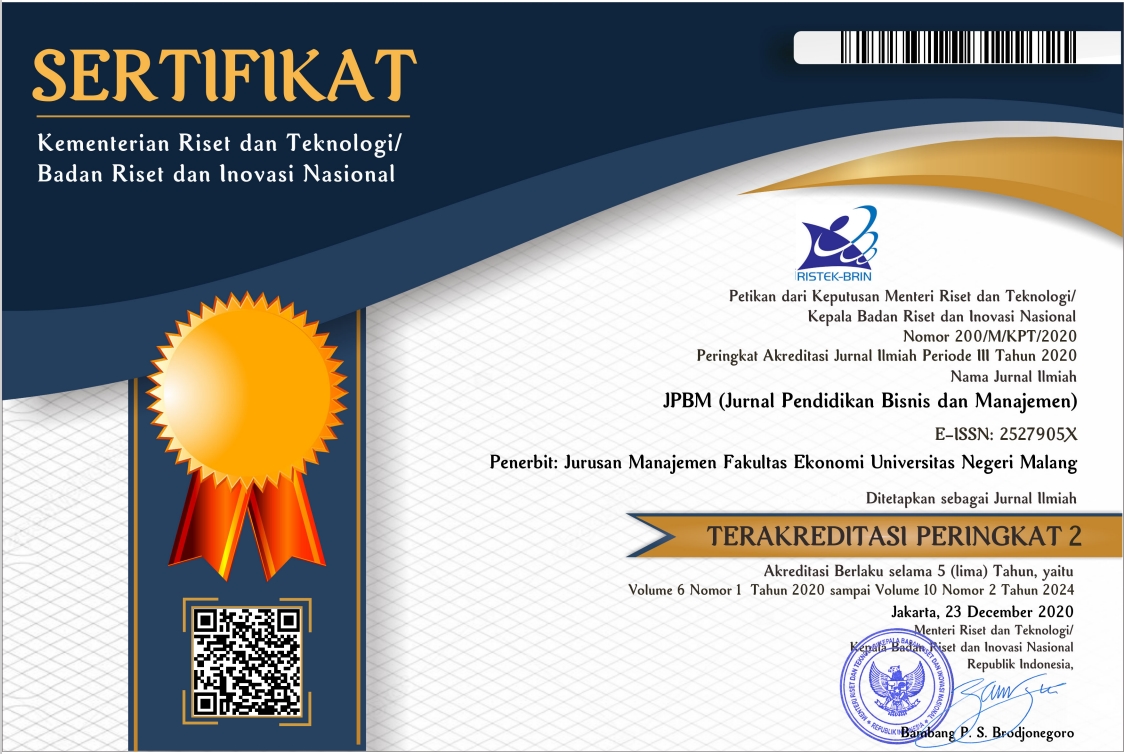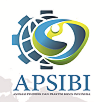Use of Learning Cooperative Integrated Reading and Composition to the Learning Achievement Indonesian Languange Correspondence in Study Programs of Office Administration
Abstract
This research aims to determine the effect of the CIRC learning model on learning achievement in the Indonesian Language Correspondence course material for writing official letters. This type of research is experimental form of non equivalent control group design. The subject of the study was all students of UNESA 2016 Office Administration Education Study Program totaling 88 students in which the experimental class was determined as class A and the control class was class B. In the learning control class, it was used the direct instruction model, while the experimental class was treated using the CIRC model. The research uses various instrument tests such as pre-test, post-test, and assignments to make official letters. The results showed that there were significant differences when comparing the average score of the control class with the experimental class, namely the cooperative reading and composition cooperative learning model had a significant effect on students’ achievement.
Keywords
Full Text:
PDFReferences
Emerson, T.L.N., English, L., & McGoldrick, K. 2016. Cooperative learning and personality types. International Review of Economics Education 21, 21–29. https://doi.org/10.1016/j.iree.2015.12.003
Gupta, M., & Ahuja, J. 2014. Cooperative Integrated Reading Composition (CIRC): Impact On Reading Comprehension Achievement In English Among Seventh Graders. IMPACT: International Journal of Research in Humanities, Arts and Literature, 2(5), 37-46.
Marpuah, S., Rahayuningsih, M., & Sukaesih. 2015. Efektivitas Model Pembelajaran Cooperative Integrated Reading and Composition (CIRC) dengan Mind Mapping. Unnes Journal of Biology Education, 4(3) 244-250.
Munir, M. T., Baroutian, S., Young, B.R., Carter, S. 2018. Flipped classroom with cooperative learning as a cornerstone. Education for Chemical Engineers 23, 25–33. https://doi.org/10.1016/j.ece.2018.05.001
Perisya, F., Zuzano, F., & Amelia, P. 2015. Penerapan Model Pembelajaran Kooperatif dengan Teknik Round Robin Pembelajaran Matematika Siswa Kelas VIII MTsN Model Padang. Jurnal Keguruan Dan Ilmu Pendidikan, 6(1), 1–11.
Rubenstein, L.D., Callan, G.L., Ridgley, L. M., & Henderson, A. 2019. Students’ strategic planning and strategy use during creative problem solving: The importance of perspective-taking. Thinking Skills and Creativity.
Saborit, J. A. P., Fernández-Río, J., Cecchini-Estrada, J. A., Méndez-Giménez, A., & Alonso, D. M. 2016. Teachers’ attitude and perception towards cooperative learning implementation: Influence of continuing training. Teaching and Teacher Education 59, 438–445. https://doi.org/10.1016/j.tate.2016.07.020
Sari, N. T. I., & Maimunah, S. 2017. Pengaruh Metode Pembelajaran Kooperatif Tipe Round Robin Terhadap Prestasi Mata Pelajaran Bahasa Indonesia Siswa SMA. Jurnal Ecopsy, 4(1), 25–32.
Tang, M., Werner, C., & Karwowski, M. 2016. Differences in creative mindset between Germany and Poland: The mediating effect of individualism and collectivism. Thinking Skills and Creativity 21, 31–40. https://doi.org/10.1016/j.tsc.2016.05.004
DOI: http://dx.doi.org/10.17977/um003v4i12018p001
Refbacks
- There are currently no refbacks.
JPBM (Jurnal Pendidikan dan Bisnis Manajemen) is licensed under a Creative Commons Attribution-NonCommercial-ShareAlike 4.0 International License.
JPBM (Jurnal Pendidikan dan Bisnis Manajemen) is abstracted and indexed in :
















